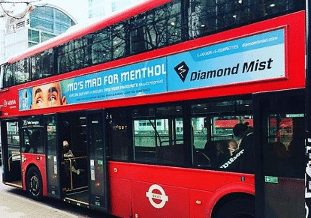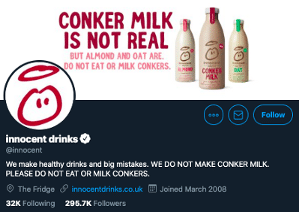Calling 2020 a ‘bad year’ feels a bit of an understatement all things considered.
A national pandemic has disrupted businesses everywhere, meaning that marketing is more important than ever.
Now is not the time to mess it up.
However, some companies have completely missed the mark, some in funnier ways than others.
Therefore, continuing our series of ‘The Worst Marketing Campaigns of the Year’ is perfect for showing you the major ‘don’ts’ in the world of ad campaigns.
If you enjoy laughing at and learning from the worst marketing campaigns, you can check out the previous articles ‘The 4 Worst Marketing Campaigns of 2018’, and ‘The Worst Marketing Campaigns of 2019…so far’.
Here are the worst marketing campaigns of 2020 so far.
Endorsed by Sir Mo Farah

In early 2020, Mo Farah began the process of suing vape liquid and e-cigarette company Diamond Mist.
Diamond Mist had used a Mo lookalike and the slogan ‘Mo’s mad for menthol’ on the side of London Buses to promote their menthol e-liquid range, claiming that this damaged his image.
Farah issued a tweet shortly after the campaign was unveiled confirming that he had no associations with the company and the bald man in the ad was certainly not him.
However hilarious to the outsider, the ad was removed by the advertising standards agency and Diamond Mist are suffering a hefty payout.
All we can say about this marketing blunder is really?
Key Takeaway: Celebrities and famous faces can be really effective in promoting brands and products, however tempting it might be, don’t impersonate them, they don’t like it.
Conker Milk?

This one is not so much bad, just really funny.
Innocent, being their light-hearted selves, released a fake announcement for a new vegan-friendly milk drink. Made from conkers. Assuming that everyone would get the seasonal joke, they didn’t make clear in the tweet that the drink wasn’t real and therefore received a wave of confused customers rightly suggesting that you can’t get milk from a conker and that if you could it would be poisonous to drink.
Quickly realising that the ad hadn’t gone down how they had anticipated, they released a series of tweets begging their customers not to eat or milk conkers.
Eventually, they made a new ad campaign acknowledging their previous faux pas as well as promoting the vegan-friendly milk drinks that they do actually sell.
Key takeaway: Not everyone is going to interpret ads the way you expect them to, be clear in your messaging to avoid misinforming your prospects.
A Not So Happy Christmas

Exercise bike company Peloton released a Christmas ad in late 2019 which featured their exercise bike being given as a gift. The ad showed a husband giving his (very slim) wife the exercise bike as a gift suggesting to some viewers that she needed to lose weight.
Whether this was the intent of the ad or not, it was certainly tone-deaf in the wake of female body empowerment. The ad was branded as sexist and misogynistic by enraged fans and was even trolled by Ryan Reynolds’ Aviation Gin, however, Peloton has stood by it. Before the campaign rolled out, Peloton was valued at $9.39bn. Following its release, Peloton shares dropped 9% by the end of the first day and a further 6% by lunchtime the next day causing a loss of $1.5bn in value.
The ad unintentionally alienated a lot of their potential customers. They have recently released their first ad campaign since the controversy and have opted to use real Peloton Riders. It appears to have been better received than this PR disaster.
Key takeaway: Ensure you avoid playing on gender stereotypes within your marketing campaigns. This can cause a headache with a sharp drop in share value.
’12 Years of Slave’ Workout

PureGym Luton and Dunstable shared a post on their Facebook page at the start of October leading to online backlash over the name of their new workout to celebrate black history month. The ‘12YearsOfSlave’ workout wasn’t helped by the phrase, ‘Slavery was hard and so is this’.
PureGym promptly took down the post and issued an apology stating that they did not endorse or approve of the post before it was made. The personal trainer, who made the post, intended to celebrate black culture and history but completely missed the mark and came across as extremely insensitive.
This caused PureGym to be branded as a racist organisation with many people taking to Twitter to voice their annoyance with the post. This has led to members of the gym cancelling their memberships.
Key takeaway: Cultural sensitivity is extremely important, but especially now with the publicity of BLM meaning there is no excuse. Therefore, you should always assess the content and context of your post to avoid any misinterpretation.
What Can We Say?
Once again, a number of these campaigns came about with good intentions, yet have all ended up achieving the opposite of what they intended.
As with any risks, be sure to assess the potential backfire before taking them, and also be sure that what you’re looking to do is not going to be lost in translation.
Are you looking for some new campaign inspiration? We can help. Book a call and find out how we could help you do something different.
Alternatively, get in touch with us using the below details: